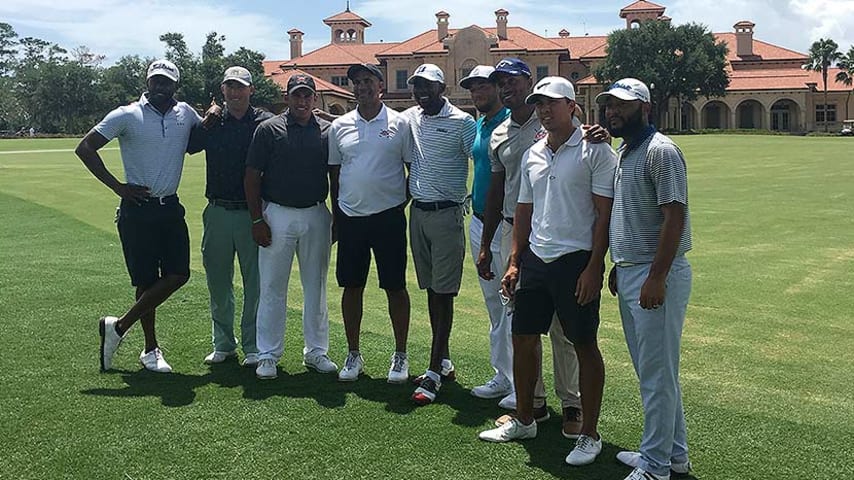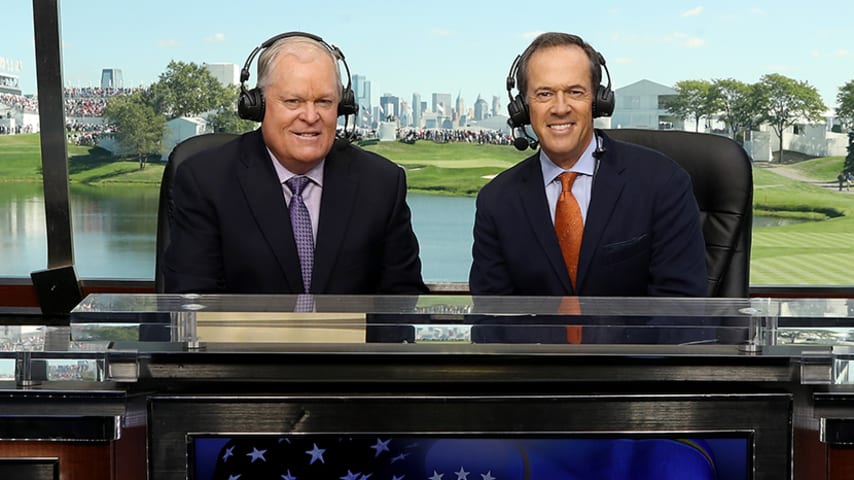APGA Tour helping to bring diversity to golf
6 Min Read

Written by Adam Schupak

Advocates Pro Golf Association celebrates 10th season
Eleven years ago, former PGA TOUR pro Adrian Stills was invited to conduct a golf clinic in Las Vegas. He stood on the fourth tee at Rio Secco Golf Club when one of the other members of his foursome, Ken Bentley, asked him to explain why it had been nearly 25 years since an African-American had made it through the TOUR’s Qualifying School.
Sure, Tiger Woods had bypassed it altogether in 1996, and emerged as the World No. 1, but where were all the other minorities that were supposed to follow in his footsteps? The floodgates never opened.
Bentley, an executive with Nestle USA, recently had watched “Uneven Fairways: The Story of the Negro Leagues of Golf,” a 2009 documentary chronicling the victories and struggles of African-American golfers. He couldn't understand why there were fewer minorities playing at the game's highest level than when Stills earned his TOUR card for the 1986 season.
Stills ticked off several reasons for their lack of progress, but as far as he was concerned, the lack of a place to play topped the list. He explained how in his day, he competed and honed his game in tournaments organized by the United Golf Association, a series of professional events for blacks conceived during the era of racial segregation in the United States.
"Ken looked me in the eye and said, 'Let's re-create it,'" Still recalls.
And thus was born the Advocates Pro Golf Association, designed to bring greater diversity to the game by developing African-Americans and other minorities for careers in golf. Stills developed the blueprint. Celebrating its 10th season, the APGA has grown from three events in its debut to a full-fledged seven-event series, including its first 72-hole tournament, which was won by former Web.com Tour player Brad Adamonis on Feb. 3.
This year's schedule features tournaments at TPC Scottsdale and Innisbrook Resort, the same courses that host PGA TOUR events. In doing so, the APGA has re-established a platform for minority golfers to succeed in the professional ranks.
Tim O'Neal, who has earned playing privileges on the Web.com Tour and PGA TOUR Latinoamerica during his career, has witnessed the Advocates Tour's evolution, having finished tied for second in the inaugural event in 2010 at historic Rogers Park in Tampa and winning the Lexus Cup Player of the Year award in 2018.
"It's been huge for everyone who plays in it," says the 46-year-old O'Neal. "It's a chance for us to see where our game is, how it stacks up and learn where we need to improve."
O’Neal was recently selected by Tiger Woods for the Charlie Sifford Memorial Exemption at next week’s Genesis Open, an event run by Woods’ foundation. “I’m looking forward to seeing Tim compete in the Genesis Open,” Woods said in a press release announcing the exemption. “Like Charlie did as a player, Tim has shown great determination in his professional career.”
To its everlasting credit, the Advocates is a grassroots effort that began as a group of 20-30 friends that gathered a couple times a year and bonded over golf outings. On one occasion, Bentley purchased a set of golf clubs and sold raffle tickets, donating the money raised to a local charity.
In 2006, they formalized the group as Advocates USA, a501(c)(3) organization comprised of African-American men from across the country. Advocates membership has grown steadily as has its purpose: mentoring youngsters and contributing more than a $1 million to charities and scholarships.
The non-profit organization does more than just sponsor professional golf tournaments. Every event combines health and wellness and career fairs. APGA also sponsors Diversity Symposiums where leaders of the minority golf community gather to discuss ways too best introduce diversity at all levels of the game.
To bring greater diversity to golf, the APGA Tour has partnered with inner-city youth organizations to host golf clinics that introduce both boys and girls ages 14-22 -- most of whom have never touched a club before -- to the game.
"Everyone talks about who is the next Tiger Woods? I think he or she is somewhere in one of our youth classes," Bentley says.
While graduating to the PGA TOUR remains the primary goal, the APGA also prepares its players for a potential future working in the golf business.
"We do more than just help our players with their game," Bentley says.
That may be an understatement. Life on the mini-tours is a struggle for most trying to climb the ladder rung by rung. Bentley says the APGA has paid medical bills for a player with a bad back who couldn't afford to go to an orthopedic surgeon as well as for a pro's asthma medication, and also sent a plane ticket to a competitor who couldn't afford the expense.
"Our guys sleep five to six to a room and have putting contests to determine who gets the bed," Bentley says.
“What's so unique about the APGA Tour is it feels like a big family," adds Wyatt Worthington, a 31-year-old PGA professional at The Golf Depot at Central Park in Gahanna, Ohio. Worthington qualified for the 2016 PGA Championship by finishing sixth at the 2016 PGA Club Professional Championship, becoming the second African-American qualifier for the PGA Championship via that route.
The APGA still has ambitions of growing to 10 events, but it already has become every bit the traveling band of tournaments that Stills envisioned with a database of 140 players.
Before they made it to the big time, Harold Varner III and Tony Finau, who became the first Tongan to play on the PGA TOUR, competed in APGA events in Tampa and Los Angeles, respectively. But Bentley concedes that the process of developing the next generation of TOUR pros has taken longer than he expected.
"We have some guys really knocking on the door," he says.
Bentley recites a host of names, including Joseph Bramlett -- who is looking to get back on TOUR after being sidelined by injuries—along with Willie Mack III, Trey Valentine and Christian Heavens.
"There are several players with the talent to play on the Web.com Tour right now," O'Neal says. "They just need the opportunity."
| 2019 APGA Tour schedule | ||
|---|---|---|
| Date | Location | Course |
| Jan. 31-Feb. 3 | Los Angeles | Pacific Palms Resort |
| March 23-24 | Miami | Grand Palm |
| April 29-30 | Phoenix | TPC Scottsdale |
| May 20-21 | Tampa | Innisbrook Resort |
| June 24-25 | Dallas | TPC Craig Ranch |
| Aug. 19-20 | Atlanta | TBD |
| For more information, click here | ||
Each APGA Tour event -- fields typically consist of 40-50 players with 80 spots in the Tour Championship -- holds eight spots for promising high school and college players so they can determine if they have the desire to pursue a career in professional golf. Scores keep trending lower.
The APGA Tour has elevated its game, too, upgrading courses and increasing purses. First prize has grown from $4,000 to $15,000 at this season's Tour Championship in Atlanta, and overall prize money will top $200,000 this season.
As the APGA Tour has grown, so has its list of sponsors. From its humble beginnings with a grant from Nestle's and Farmers Insurance, the APGA Tour has inked deals with the Aids Healthcare Foundation, City National, and a five-year partnership with the PGA TOUR in 2013, which was extended two more years. In 2018, Lexus agreed to a three-year deal to be the circuit's presenting sponsor, including to fund the season-long Lexus Cup and a $30,000 bonus pool that pays the top-five finishers to help fund Q-School dreams.
O'Neal, who won the top prize, used it to pay for European Tour Q-School.
"You need both the finances to have the opportunity to do it and the tenacity to hang in there until you break through," Stills says. "You have to really love it. You've got to really want it."
And it doesn't hurt to have a series of events to play.












